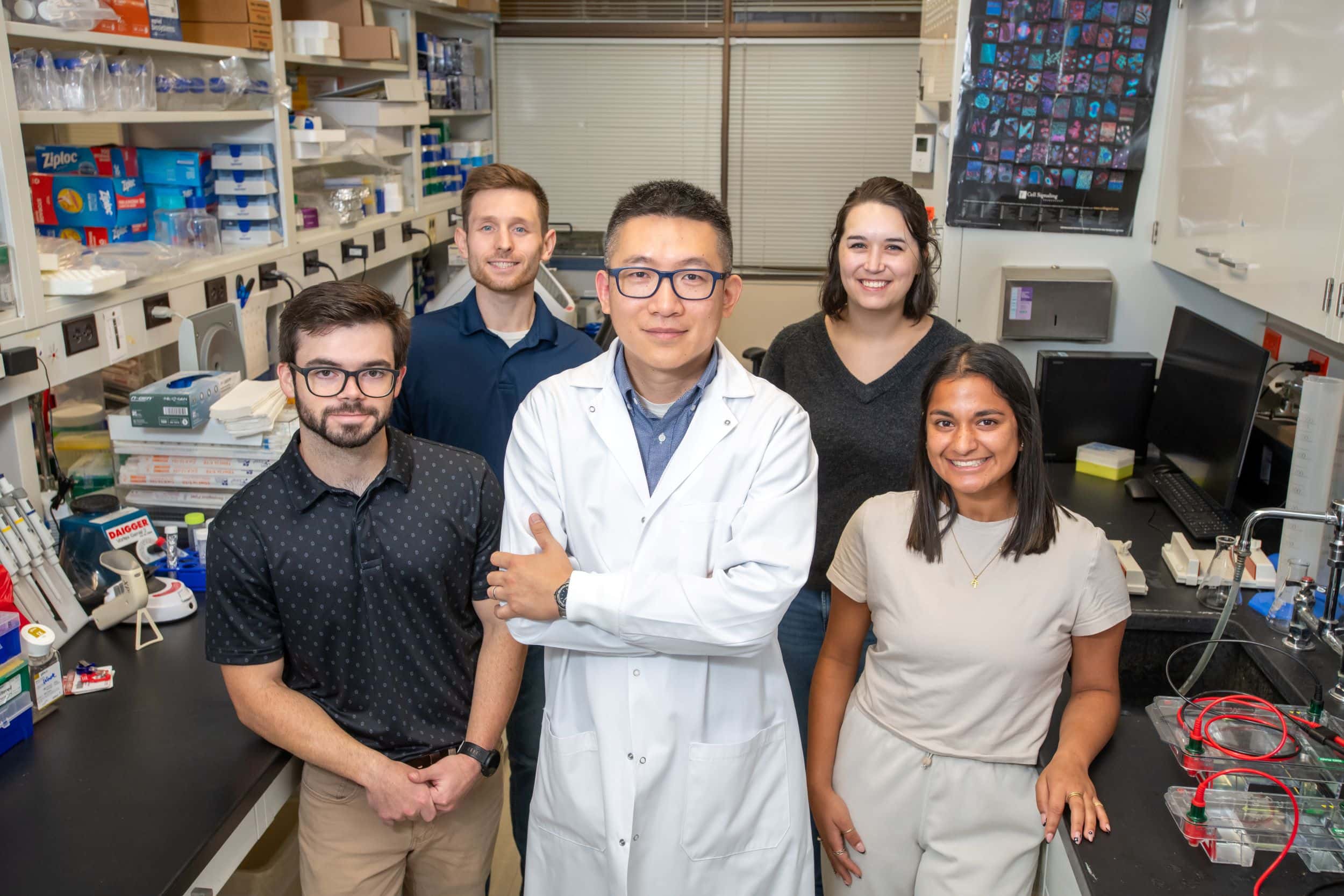View Larger Image

Lu Huang, Ph.D., center, with his lab team at UAMS (front, l-r): J. Tucker Andrews and Ananya Ranaraja; and (back): Grant Dawson and Jilliyn Jeu.
Image by Bryan Clifton
NIH Awards UAMS $3.7 Million in Quest for More Effective Tuberculosis Vaccine
| LITTLE ROCK — UAMS researcher Lu Huang, Ph.D., has received a $3.7 million grant from the National Institutes of Health (NIH) to support his pursuit of a more effective tuberculosis (TB) vaccine, a feat that has eluded scientists for more than 100 years.
The five-year grant from the NIH National Institute of Allergy and Infectious Diseases will allow Huang to explore new ways to help the body fight TB based on his recent findings.
Bacille Calmette-Guérin (BCG) is the only approved vaccine available today and has been used since 1921. Although protective for children, its effectiveness when given to adults remains uncertain, and it is not commonly used in the United States.
Huang, who has been studying TB since 2014, is taking a different approach by focusing on a type of lung immune cell that he found allows TB-causing bacteria, Mycobacterium tuberculosis (Mtb), to quickly multiply. The immune cells, known as alveolar macrophages, offer a hospitable environment for growth of Mtb soon after it gets into the lungs via airborne transmission.
Huang secured the NIH grant after discovering how macrophages respond differently to TB infection depending on their origin and the potential for reprogramming their metabolic pathways.
“We’re thinking we can harness these cells to make them more restrictive or controlling of the growth of Mtb,” he said. “If we can identify certain metabolic pathways and if we inhibit or boost these pathways, we can have more effective immune responses to TB.”
Huang is breaking new ground, noting that there hasn’t been comprehensive research into understanding the origin (called ontogeny) and metabolism of macrophages in TB.
“Those two angles are exciting areas for us to pursue,” he said. “The significance of this work is that it’s really translational to human vaccines or therapeutics against this disease because we can identify genes or pathways, that may be druggable or can be the targets for therapeutics.”
The research includes a collaboration with UAMS clinician and researcher Josh Kennedy, M.D., based at the Arkansas Children’s Research Institute. Kennedy’s expertise includes allergic and immunologic diseases. He is an associate professor in the Department of Pediatrics, Division of Pediatric Allergy/Immunology and Department of Internal Medicine, Pulmonary and Critical Care Medicine, and he sees patients at Arkansas Children’s Hospital.
Mtb has been responsible for more human deaths than any other pathogen until the COVID-19 pandemic, according to the World Health Organization.
Although TB is preventable and curable with a long course of antibiotics, 1.3 million people died from TB in 2022.
The United States has one of the lowest TB rates globally and has a goal of eliminating TB by 2035.
Huang credited substantial UAMS support for allowing him to develop the preliminary data to secure the NIH grant. The UAMS College of Medicine provided a startup research funding package when he was recruited to UAMS in 2020 from Cornell University in Ithaca, New York. In addition, the UAMS Center for Microbial Pathogenesis and Host Inflammatory Responses provided funding to support his work. The center is funded by a NIH Centers of Biomedical Research Excellence (COBRE) grant, which it uses to help promising early career researchers to become independently funded.
UAMS is the state’s only health sciences university, with colleges of Medicine, Nursing, Pharmacy, Health Professions and Public Health; a graduate school; a hospital; a main campus in Little Rock; a Northwest Arkansas regional campus in Fayetteville; a statewide network of regional campuses; and eight institutes: the Winthrop P. Rockefeller Cancer Institute, Jackson T. Stephens Spine & Neurosciences Institute, Harvey & Bernice Jones Eye Institute, Psychiatric Research Institute, Donald W. Reynolds Institute on Aging, Translational Research Institute, Institute for Digital Health & Innovation and the Institute for Community Health Innovation. UAMS includes UAMS Health, a statewide health system that encompasses all of UAMS’ clinical enterprise. UAMS is the only adult Level 1 trauma center in the state. UAMS has 3,485 students, 915 medical residents and fellows, and seven dental residents. It is the state’s largest public employer with more than 11,000 employees, including 1,200 physicians who provide care to patients at UAMS, its regional campuses, Arkansas Children’s, the VA Medical Center and Baptist Health. Visit www.uams.edu or uamshealth.com. Find us on Facebook, X (formerly Twitter), YouTube or Instagram.###